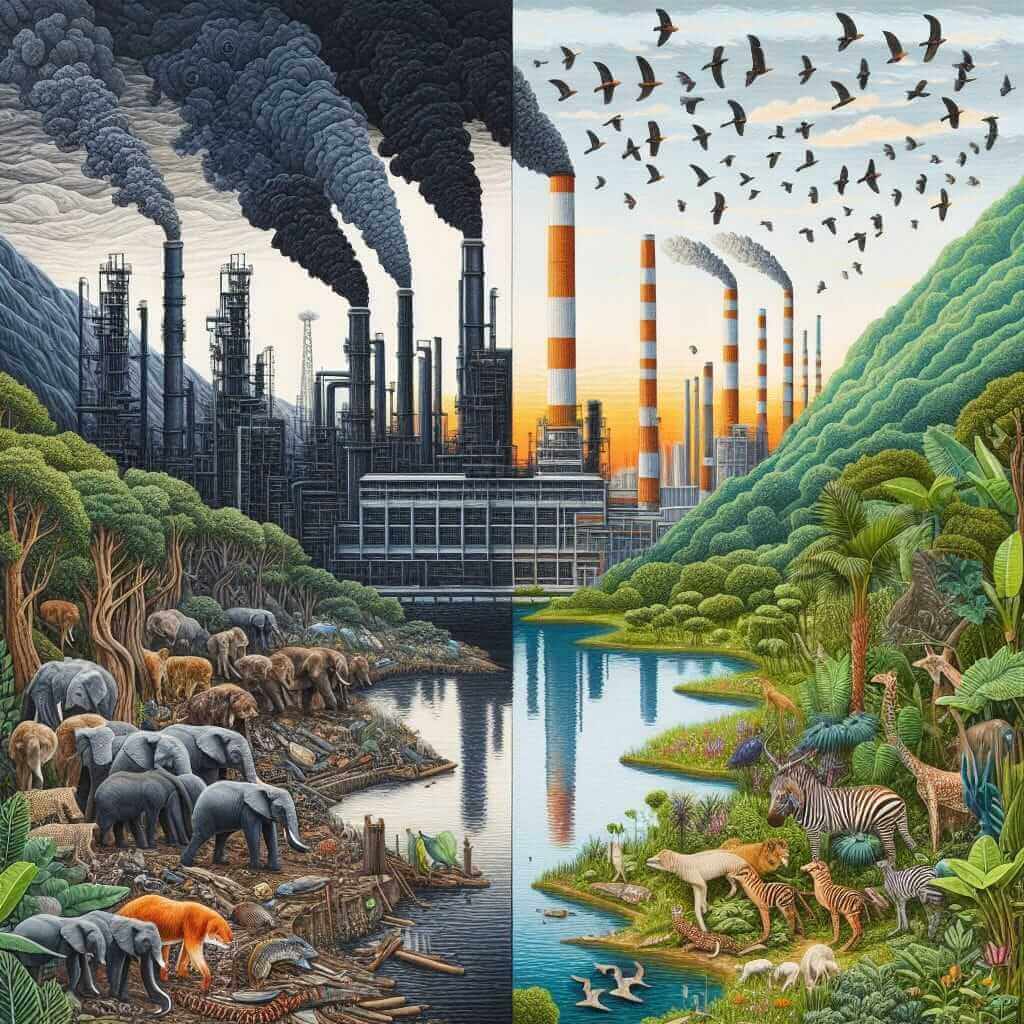The role of government in safeguarding endangered species is a topic frequently appearing in IELTS Writing Task 2, reflecting its global significance. Understanding this issue requires exploring the delicate balance between economic development and environmental preservation. This article will delve into common exam questions, analyze a chosen question, provide a band 8 model answer, and highlight key vocabulary for success in the IELTS exam.
Here are some potential questions you might encounter in the IELTS exam related to this topic:
- To what extent do you agree or disagree that governments bear the sole responsibility for protecting endangered species?
- Some people believe that conservation efforts are a waste of resources that should be used for more pressing human needs. Discuss both views and give your opinion.
- What are the most effective measures governments can take to protect endangered species? Discuss.
Model Answer and Analysis
Chosen Question:
Some individuals argue that conservation efforts are a waste of resources that should be used for more pressing human needs. Discuss both views and give your opinion.
Analysis:
This question presents a classic “discuss both views” structure, requiring a balanced examination of two opposing viewpoints before presenting a clear personal stance. We must delve into the arguments for prioritizing immediate human needs and counter them with the long-term benefits of conservation.
Model Answer:
The escalating extinction rate of various species has sparked debate regarding the allocation of resources, with some advocating for prioritizing immediate human needs over conservation efforts. While it is undeniable that alleviating poverty and improving healthcare are critical, I firmly believe that protecting endangered species is equally vital for a sustainable future.
Proponents of prioritizing human needs argue that scarce resources should be directed towards addressing pressing issues such as hunger, disease, and lack of education. They contend that investing in conservation diverts funds from these critical areas, hindering progress in improving human well-being. Furthermore, they highlight that many endangered species have limited economic value, making their conservation appear frivolous in the face of urgent human needs.
However, this short-sighted perspective fails to recognize the interconnectedness of ecosystems and the long-term benefits of conservation. Endangered species play crucial roles in maintaining biodiversity, which underpins the health of entire ecosystems. Their extinction can trigger a domino effect, disrupting food chains, increasing pest populations, and ultimately impacting human livelihoods. Moreover, investing in conservation can foster ecotourism, create jobs, and drive sustainable economic growth in local communities.
<
In conclusion, while addressing immediate human needs is imperative, neglecting conservation would be a grave mistake. Governments and individuals alike must recognize the intrinsic value of biodiversity and strive for a balanced approach that safeguards both human well-being and the planet’s irreplaceable natural heritage. (Word count: 270 words)
Key Considerations for Writing:
- Structure and Coherence: This essay follows a clear structure: introduction, body paragraph 1 (opposing view), body paragraph 2 (supporting view), and conclusion. Ensure your essay flows logically with clear topic sentences and transitions.
- Vocabulary and Grammar: Use a variety of vocabulary related to the topic, such as “endangered species,” “conservation efforts,” “biodiversity,” and “sustainable development.” Demonstrate grammatical accuracy and complexity throughout.
- Supporting Arguments: Support your arguments with relevant examples and explanations. In this essay, the interconnectedness of ecosystems and the economic benefits of ecotourism were used as supporting points.
Essential Vocabulary:
- Endangered species (noun) /ɪnˈdeɪn.dʒərd ˈspiː.ʃiːz/: A species of animal or plant that is at serious risk of extinction.
- Conservation (noun) /ˌkɒn.səˈveɪ.ʃən/: The act of protecting and preserving something, especially the natural environment.
- Biodiversity (noun) /ˌbaɪ.əʊ.daɪˈvɜː.sə.ti/: The variety of life in a particular habitat or ecosystem.
- Ecosystem (noun) /ˈiː.kəʊˌsɪs.təm/: A community of living organisms and their physical environment, interacting as a system.
- Sustainable development (noun) /səˈsteɪ.nə.bəl dɪˈvel.əp.mənt/: Economic development that meets the needs of the present without compromising the ability of future generations to meet their own needs.
- Habitat loss (noun) /ˈhæb.ɪ.tæt lɒs/: The destruction or degradation of the natural environment where a species lives.
- Poaching (noun) /ˈpəʊ.tʃɪŋ/: The illegal hunting or capturing of animals, typically for their valuable parts.
- Climate change (noun) /ˈklaɪ.mət tʃeɪndʒ/: Long-term shifts in global temperatures and weather patterns, primarily caused by human activities.
- Wildlife trafficking (noun) /ˈwaɪld.laɪf ˈtræf.ɪk.ɪŋ/: The illegal trade of wild animals and their parts, often across international borders.
- Protected area (noun) /prəˈtek.tɪd ˈeə.ri.ə/: A clearly defined geographical space, recognized, dedicated and managed, through legal or other effective means, to achieve the long-term conservation of nature.
Conclusion:
Mastering the topic of government’s role in protecting endangered species is crucial for success in IELTS Writing Task 2. By understanding both sides of the argument, using strong vocabulary, and providing clear examples, you can effectively demonstrate your English language proficiency and achieve a high band score. Remember to practice writing essays on similar topics to further enhance your skills. Good luck with your IELTS preparation!